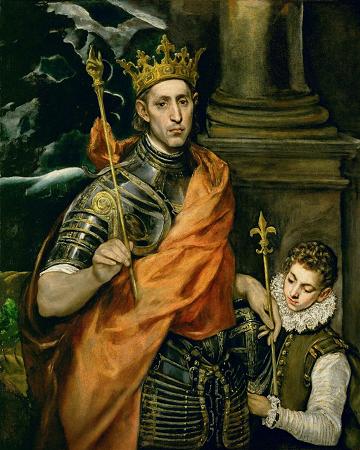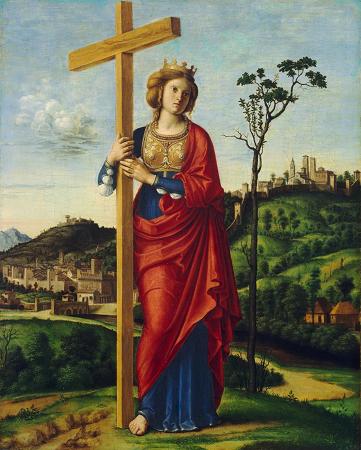Saint Louis. Louis IX, commonly known as Saint Louis, is the only King of France to be canonized in the Catholic Church. Louis was crowned in Reims at the age of 12, following the death of his father Louis VIII; his mother, Blanche of Castile, ruled the kingdom as regent until he reached maturity. During Louis' childhood, Blanche dealt with the opposition of rebellious vassals and obtained a definitive victory in the Albigensian Crusade which had started 20 years earlier. As an adult, Louis IX faced recurring conflicts with some of the most-powerful nobles, such as Hugh X of Lusignan and Peter of Dreux. Simultaneously, Henry III of England tried to restore his continental possessions, but was utterly defeated at the battle of Taillebourg. His reign saw the annexation of several provinces, notably parts of Aquitaine, Maine and Provence. Louis IX was a reformer and developed French royal justice, in which the king was the supreme judge to whom anyone could appeal to seek the amendment of a judgment. He banned trials by ordeal, tried to prevent the private wars that were plaguing the country, and introduced the presumption of innocence in criminal procedure. To enforce the application of this new legal system, Louis IX created provosts and bailiffs. Following a vow he made after a serious illness and confirmed after a miraculous cure, Louis IX took an active part in the Seventh and Eighth Crusades. He died from dysentery during the latter crusade, and was succeeded by his son Philip III. Louis's actions were inspired by Christian zeal and Catholic devotion. He decided to severely punish blasphemy, gambling, interest-bearing loans and prostitution. He spent exorbitant sums on presumed relics of Christ, for which he built the Sainte-Chapelle. He expanded the scope of the Inquisition and ordered the burning of Talmuds and other Jewish books. He is the only canonized king of France, and there are consequently many places named after him. Much of what is known of Louis's life comes from Jean de Joinville's famous Life of Saint Louis. Joinville was a close friend, confidant, and counselor to the king, and he also participated as a witness in the papal inquest into Louis' life that ended with his canonisation in 1297 by Pope Boniface VIII. Two other important biographies were written by the king's confessor, Geoffrey of Beaulieu, and his chaplain, William of Chartres. While several individuals wrote biographies in the decades following the king's death, only Jean of Joinville, Geoffrey of Beaulieu, and William of Chartres wrote from personal knowledge of the king, and all three are biased favorably to the king. The fourth important source of information is William of Saint-Parthus' 19th century biography, which he wrote using the papal inquest mentioned above. Louis was born on 25 April 1214 at Poissy, near Paris, the son of Louis the Lion and Blanche of Castile, and baptised in La Collegiale Notre-Dame church. His grandfather on his father's side was Philip II, king of France; while his grandfather on his mother's side was Alfonso VIII, king of Castile. Tutors of Blanche's choosing taught him most of what a king must know, Latin, public speaking, writing, military arts, and government. He was nine years old when his grandfather Philip II died and his father ascended as Louis VIII. Louis was 12 years old when his father died on 8 November 1226. He was crowned king within the month at Reims Cathedral. Because of Louis's youth, his mother ruled France as regent during his minority. Louis' mother trained him to be a great leader and a good Christian. She used to say: I love you, my dear son, as much as a mother can love her child; but I would rather see you dead at my feet than that you should ever commit a mortal sin. His younger brother Charles I of Sicily was created count of Anjou, thus founding the Capetian Angevin dynasty. No date is given for the beginning of Louis's personal rule. His contemporaries viewed his reign as co-rule between the king and his mother, though historians generally view the year 1234 as the year in which Louis began ruling personally, with his mother assuming a more advisory role. She continued to have a strong influence on the king until her death in 1252. On 27 May 1234, Louis married Margaret of Provence and she was crowned in the cathedral of Sens the next day. Louis's marriage had political connections, his wife was sister to Eleanor, later the wife of Henry III of England.
more...





